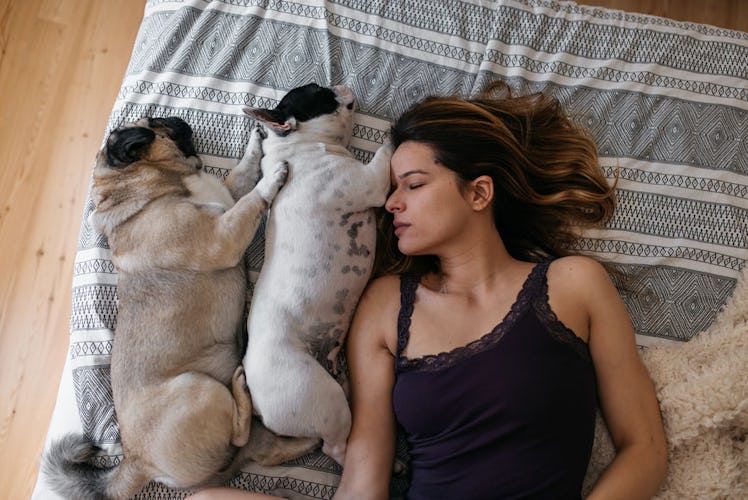
Here's How Daylight Saving Time Affects Your Sleep Schedule, According To Experts
It's almost November, folks, and you know what that means: It's about time to turn the clocks back for Daylight Saving Time so you can get another precious hour of sleep. And while an extra hour of snooze time certainly seems like something to celebrate, I can't help but wonder how Daylight Saving Time affects your sleep schedule overall. If everything is moved back an hour, it kind of seems like your circadian rhythm — aka that internal clock inside your body that controls when you're awake or asleep — would be affected, too, no? So, could Daylight Saving Time actually be a bad thing for your sleep health?
First of all, according to a survey from The Tylt, people are pretty anti-Daylight Saving Time on the whole, as the platform found that the vast majority of people who voted on this particular debate would prefer to do away with changing the clocks altogether. I mean, personally, I've never quite understood why Daylight Saving Time is a thing in the first place, and plenty of people have argued against the tradition.
Still, regardless of what you think about changing the clocks twice a year, it's something we humans do every fall and spring, so you may as well figure out how to best take care of yourself when Daylight Saving Time inevitably rolls back around again.
As Anthony Komaroff, M.D., the Steven P. Simcox/Patrick A. Clifford/James H. Higby Professor of Medicine at Harvard Medical School, wrote in an article for the Harvard Health Blog, a one-hour shift in your sleep cycle — even one that means you're technically getting an "extra" hour of sleep — can affect your sleep schedule for as long as an entire week after the fact. For example, Komaroff explained, that shift might cause you wake up earlier than usual, or have trouble falling asleep at your usual bedtime, or it could even lead you to wake up at random times throughout the night. None of that sounds very fun or restful, does it?
Dr. Benjamin Smarr, a National Institutes of Health postdoctoral fellow at UC Berkeley and Reverie sleep advisory board member, shares something similar: The effects of Daylight Saving Time, he tells Elite Daily in an email, can be somewhat similar to those of jet lag, regardless of which way the clocks are turning.
For the smoothest transition, you can get ahead of the change by adjusting your overall routine accordingly, Dr. Smarr explains, including details like your meals, and of course, your bedtime. Specifically, he suggests that, about four days before Daylight Saving Time, you should start to progressively move things up (i.e. earlier) in your everyday schedule by about 15 minutes per day.
For example, say you usually eat dinner around 7:30 p.m., and your bedtime is typically around 11 p.m. According to Dr. Smarr's advice, you should prepare for Daylight Saving Time by eating dinner around 7:15 p.m. instead, and going to bed at about 10:45 p.m. — and, leading up to the actual day of the clock change, keep moving both of these times up in 15-minute increments. "This will ensure there is no sudden transition," Dr. Smarr says, "as your body can easily cope with 15 minutes of change in a day."
You can also try opening up your blinds and curtains the night before the clocks change, says Smarr, which will expose you to the maximum amount of morning sunlight, and may help you naturally start your day earlier in general.
On the other hand, according to experts from the University of Michigan, Daylight Saving Time might actually be a perfect opportunity to be that early riser you always dreamed of being. Cathy Goldstein, M.D., a neurologist at the university's Sleep Disorders Center, told the Michigan Health Blog,
If you have been trying to become more of a morning person or fit in a morning workout, this may now be possible. Keep regular sleep wake times and expose yourself to morning light to lock in your new, earlier sleep schedule and avoid sliding back into bad habits.
Personally, I think I'll still choose to relish the extra hour of sleep. But hey, that's just me — remember to listen to your body and honor your own needs.